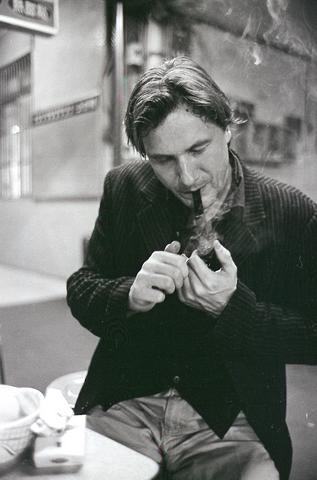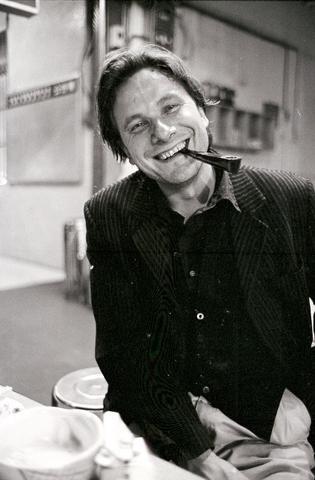At a theater on Taipei's west side, a set piece is being broken down and hauled out to make way for the next production. A couple of stagehands discuss what they'll need for the show, crunching wood shavings underfoot.
It's a scene played out at theaters the world over, but the stage at this theater is among the world's smallest, and its actors -- the ones the audience sees, at least -- are made of wood. It's TTT Puppet Theater (大稻埕偶戲館) and it's the sole puppet theater in a district that once had 10 such venues.

PHOTO COURTESY OF NATALIE FALGARONE
Presiding over the company of puppeteers, wood carvers and lighting and costume designers is Robin Ruizendaal, an 11-year resident of Taiwan and a paradox of a local personality. Though a man holding a puppet isn't often taken seriously, Ruizendaal also holds a wealth of knowledge on Chinese and Taiwanese culture, gleaned from years of research in sinology.

PHOTO COURTESY OF NATALIE FALGARONE
Ruizendaal first began learning Mandarin at 19 and continued his studies at Holland's Leiden University. In the early 1980s, he began research on his doctoral dissertation on Chinese marionette theater. It was a topic that would gain him a kind of access to Chinese culture that few researchers before him had enjoyed.
"I thought [puppet theater] was a nice window to research Chinese society because it's not upper-class culture, it's grassroots culture," he said.
"At the time China was very closed. We didn't know anything about what was happening in the countryside. I thought it was a really interesting, very localized form of art through which I could observe society, because it's related to religion, social groups, theatre, language, music. It had many elements which interested me."
In China, his research followed people associated with the art form from the Republican period in the 1920s, through the Cultural Revolution and up to the 1990s. Among his several observations, Ruizendaal said he learned that the politics of the Chinese Communist Party and the Chinese Nationalist Party were actually very similar.
"The destruction of Chinese religion was high in the priorities of both parties," he said. "I observed China as a religious state where everything is related to religion; everybody lives from house altar to neighborhood altars to temples. What the Communists were doing, as well as the Kuomintang was trying to destroy that element of Chinese culture."
The Communists succeeded in the cities, Ruizendaal said, razing hundreds of temples in Beijing alone.
"But in the countryside where I worked you see the tenacity of religious structure, which was interlinked with social culture so strong that it made an enormous rebound."
"The same thing is happening in Communist China now as happened in Taiwan, with the government initially against theater, banning it for several reasons. ... But in the 1990s there was this turnaround where Communist cadres started supporting theater as a local art, trying to make it function outside the state system."
Was it allowed to be as bawdy an entertainment as it previously had been?
"Yes. You can't get away from sex and shit," he laughs. "Without them, nobody would come."
But Ruizendaal considers Taiwanese puppet culture special compared with its counterparts in China or Japan or other parts of Asia in that it's been popularized in the media.
"Starting in the 1970s, there was an enormous craze for puppet theater -- televised puppet theater -- and so it's really part of the heritage of people in their 40s, 50s and 60s. They all have a warm feeling for puppet theater even though they don't watch it anymore."
The craze continues today, Ruizendaal said, with televised puppet shows and Web sites dedicated to puppets that provide information on each character's biography and birth sign, even their blood type.
"It goes far -- especially among university students," Ruizendaal said.
"It's one of the only forms of art that didn't come from China or Japan or the US. The traditional small puppets come from China, but the big puppets, with their specific Taiwanese lingo, they're a purely Taiwanese art."
And so Ruizendaal's job is as much popularization of puppetry as it is preservation. His main tasks, he explains, are making new plays based on traditional ones, creating a new audience for live puppet theater and promoting it abroad.
TTT works closely with theaters in Cambodia, Myanmar, Indonesia and India.
Last year they toured 12 countries. This year they'll take in five countries, including a second appearance at London's Victoria and Albert Museum.
Despite the considerable attention he's received in local media for his work, Ruizendaal doesn't find it strange that the task of preserving a uniquely Taiwanese art form has fallen to a foreigner.
"I think that, in a global perspective -- in the world of the arts, at least -- the concept of `foreigner' is changing a bit. Maybe not for bus drivers ... but in the arts it's getting quite normal to have conductors from Japan working in Europe. Puppetry is just on the periphery of the arts."
TTT Puppet Theater's upcoming shadow puppet production, The Child in the Rice Paddy (

The primaries for this year’s nine-in-one local elections in November began early in this election cycle, starting last autumn. The local press has been full of tales of intrigue, betrayal, infighting and drama going back to the summer of 2024. This is not widely covered in the English-language press, and the nine-in-one elections are not well understood. The nine-in-one elections refer to the nine levels of local governments that go to the ballot, from the neighborhood and village borough chief level on up to the city mayor and county commissioner level. The main focus is on the 22 special municipality

The People’s Republic of China (PRC) invaded Vietnam in 1979, following a year of increasingly tense relations between the two states. Beijing viewed Vietnam’s close relations with Soviet Russia as a threat. One of the pretexts it used was the alleged mistreatment of the ethnic Chinese in Vietnam. Tension between the ethnic Chinese and governments in Vietnam had been ongoing for decades. The French used to play off the Vietnamese against the Chinese as a divide-and-rule strategy. The Saigon government in 1956 compelled all Vietnam-born Chinese to adopt Vietnamese citizenship. It also banned them from 11 trades they had previously

In the 2010s, the Communist Party of China (CCP) began cracking down on Christian churches. Media reports said at the time that various versions of Protestant Christianity were likely the fastest growing religions in the People’s Republic of China (PRC). The crackdown was part of a campaign that in turn was part of a larger movement to bring religion under party control. For the Protestant churches, “the government’s aim has been to force all churches into the state-controlled organization,” according to a 2023 article in Christianity Today. That piece was centered on Wang Yi (王怡), the fiery, charismatic pastor of the

Hsu Pu-liao (許不了) never lived to see the premiere of his most successful film, The Clown and the Swan (小丑與天鵝, 1985). The movie, which starred Hsu, the “Taiwanese Charlie Chaplin,” outgrossed Jackie Chan’s Heart of Dragon (龍的心), earning NT$9.2 million at the local box office. Forty years after its premiere, the film has become the Taiwan Film and Audiovisual Institute’s (TFAI) 100th restoration. “It is the only one of Hsu’s films whose original negative survived,” says director Kevin Chu (朱延平), one of Taiwan’s most commercially successful